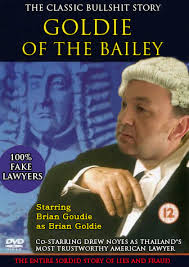‘Their only crime was to expose the illegal exploitation of migrants’
 Andrew Drummond
|
Published on Sep 1, 2015
Andrew Drummond
|
Published on Sep 1, 2015
The acquittal of Alan Morison and Chutima Sidasathian today of criminal libel and violating the Computer Crime Act is reason to celebrate.
But it may have no bearing on many cases being brought under Thailand’s Computer Crime Act not only against journalists but even tourists and resident foreigners by others who do not want their misdeeds exposed.
The Foreign Correspondents Club of Thailand today issued a statement (below) in which they hope these acquittals will discourage others in positions of authority from using these laws against journalists writing critically.
The FCCT could have mentioned that it is not only people in positions of authority using these laws but foreigners with criminal convictions even before they came to Thailand.
On a lower level the Computer Crime Act assists criminals and wealthy members of society caught with their fingers in the jam jar.
First they commit the robbery – then they use the now penniless victim’s cash to sue him if he complains.
Certain sections of the laws which were intended to protect the monarchy do more to assist the criminal because the lese majeste laws are more than adequate for the purpose they were intended.
These laws are used against journalists not by people in authority but by criminals – because they simply can.
This is the FCCT statement:
The professional membership of the Foreign Correspondents’ Club of Thailand welcomes the acquittal of two journalists charged by the Royal Thai Navy with defamation and violating the Computer Crimes Act. A judge in the criminal court in Phuket found no basis for the charges against Alan Morison and Chutima Sidasathian, the two founders of the Phuketwan news website.
The charges were filed in December 2013, over an article published six months earlier by Phuketwan, which included a 41-word paragraph from a Reuters investigation referring to the role of Thai naval forces in human trafficking. Phuketwan did not retract or apologise for their article, but they did offer the Navy the opportunity to put its case on Phuketwan. The Navy declined the offer.
The FCCT condemns the use of the Criminal Defamation and Computer Crimes Laws against journalists for their reporting, when other remedies for redress are available through civil legal action. Journalists should not be at risk of long prison sentences for what they report. We commend the court in Phuket for this encouraging verdict, which we hope will discourage others in positions of authority from using these laws against journalists writing critically.
We also urge the Royal Thai Navy to end this unwarranted case now by not appealing against the verdict. It has only served to damage the navy’s reputation, and disrupt the lives of two journalists whose only crime was to try to expose the illegal exploitation of migrants in Thailand.
COMMENT
Magnanimous in victory but this is no triumph for Thai justice
Congratulations today to Alan Morison and Chutima Sidasathian for winning their criminal libel and computer crime libel cases against the Royal Thai Navy in the court.
It’s the end of an ordeal for them and these journalists bravely fought on when a simple apology would have got them off.
Quite rightly they never gave that apology because they had done nothing wrong.
In fact they should have been praised for their coverage of the Rohingya problem. But Thailand, as is so often does, reacted negatively to criticism and instead of solving the problem as usual set about shooting the messengers. The authorities only started trying to solve the problem when the jungle death camps were discovered.
They were ‘pon prayote’ – for the benefit of all except the victims.
Despite their acquittal this is not, as they claim, a triumph for Thai justice. They will have not forgotten how they were treated like criminals.
They will not have forgotten how the case was accepted at a hearing in which they could not put their defence.
They will have not forgotten that in Thailand ‘might is right’ and anybody takes on institutions or people in positions of power, or wealth, in the Thai justice system at their peril.
The system is no better than can be expected in countries such as Cambodia, Laos or Vietnam.
According to reports today the judges in Phuket ruled that the computer crime laws were misused. They were not designed to be used against journalists and the suppression of free speech. In that case why are they?
Any journalist wishing to conduct an investigation that is going up against the authorities had better not live in Thailand. Andrew McGregor Marshall, former Reuters Baghdad Bureau chief has left, I have left, and most of the controversial stuff is done by visiting journalists – take the Guardian’s report and video on slave trade in the Thai fishing industry as an example.
But another person who could have left is Andy Hall the migrant workers activist, who is also sticking to his guns – and is being supported morally at least by the rest of the world.
I could have stayed too, but I have three young children aged 7, 5 and 3 needing to enter a decent education system. By staying I would have place their entire future in jeopardy, not from cases brought against me, but from foreign boiler room fraudsters who have the protection of the authorities.
They would not have bothered to use the Computer Crime Act if previous cases against their enemies are anything to go by. They would have set me up with a shaming criminal offence. They had already invited me to police headquarters. I declined, and, luckily as it turned out, that particular officer took a fall from a high place and died and his department was overturned by the army.
In relation to the Computer Crimes Act I am being pursued by two convicted criminals – and they are not even suing over anything I have written.
The first is Brian James Goudie (formerly Goldie) a 48-year-old Scot who was convicted in Australia for stealing AUS$400,000- from his employer and who in his home country was the subject of an arrest warrant for fraud on the Royal Bank of Scotland.
He re-invented himself in Thailand as a British barrister and former officer in the Royal Marines and set about cheating people. I put up warnings about this man after checking with the Royal Navy, and the University where he said he had obtained a law degree.
Goudie is himself on trial for cheating a 78-year-old American woman out of some US$240,000 or 7.8 million Thai baht in legal services (He charged 50,000 baht a day).
 |
| Goudie suing |
Her view of the Thai legal system is unequivocal. Her son died in jail while Goudie was dragging out the legal process. She gave up in her fight for justice in Thailand. The pile of injustice in Thailand, she said, was ‘way too heavy for a 78-year-old woman to cope with’.
Goudie, as readers of this site will know is suing me under the computer crime act for libel for clearly photo-shopped pictures of him dressed as a barrister and officer of the Royal Marines – and the court accepted the cases!
The second man Drew Walter Noyes, 60, is a man with a criminal history for larceny in the United States, who was exposed long before he came to Thailand in the Wilmington Morning Star in North Carolina – in relation to share and property fraud.
He too is suing for being lampooned in a picture – in this case of him taking part in a gay parade.
Amazingly he is suing for being ridiculed and, he claims, made out to look like a homosexual.
Even being called gay in the real world is not libelous in the 21st century. But in any case the story stated he was not gay (He officially has eight children by Thai women).
The picture was reprinted from a website (which also denied he was gay) in story saying he was suing the website. In any case this was odd because Noyes claimed to be the owner of Spice Magazine- then billed as the biggest gay mag in Thailand.
 |
| Goudie and Noyes suing |
In fact these cases were
SLAPP* cases which are taken out not in expectation of a success but to deprive defendants of funds and their ability to work – and they found a willing ally in the Thai justice system.
Legislation is in place in the United States to prevent this abuse.
But back to Alan and Chutima, They know had they lost they would not have been able to criticize the courts or the judges.
And they will know that Phuket Court has not been a beacon of justice in Thailand. A judge there has stated in the past that he does not want journalists in court. They can apply for the judgment at the end of the case.
As it is no courts are properly covered by journalists in Thailand. It would be impossible to do so.
That is the status quo.
*SLAPP wikipedia
EUROPEAN UNION: “The EU is committed to promoting and protecting the freedom of opinion and expression worldwide.
The EU Delegation wishes to express its concern over the increasing misuse of criminal defamation laws in Thailand. The EU believes that defamation laws should not be misused to censor criticism and debate concerning public issues as this constitutes a serious threat to Freedom of Expression.
Recent cases brought against Human Rights Defender Andy Hall, journalists Alan Morison and Chutima Sidasathian from the”Phuketwan” newspaper, and the freelance journalist Andrew Drummond have served to demonstrate how criminal defamation laws are vexatiously used to silence freedom of expression and investigative journalism in the country.
The EU would like to appeal to State authorities to fully abide by their international obligations.
As part of wider reform in Thailand, we urge the National Reform Council to address this issue, so that criminal defamation laws can not in the future be used as a means of silencing legitimate analysis or debate.”
FCCT:he professional membership of the Foreign Correspondents’ Club of Thailand supports the following statement endorsed by the European Union heads of mission in Thailand concerning the abuse of a suite of defamation laws that continue to stifle legitimate investigation on matters of public interest, free speech and fair comment with the threat and application of criminal penalties.
There has long been concern in such cases that telling the truth may not stand up as a defense in court. Among a number of other concerns is the use of vexatious litigation, or malicious prosecution, in which defendants are forced to defend multiple similar cases filed in different locations by the same plaintiffs or plaintiffs working in concert.
Such tactics do not serve the cause of justice or openness and squander public funds in the courts. They should be investigated as a matter of urgency.
About the Author
Andrew Drummond
Andrew Drummond is a British independent journalist and occasional television documentary maker. He is a former Fleet Street, London, journalist having worked at the Evening Standard, Daily Mail, Mail on Sunday, News of the World, Observer and The Times.




